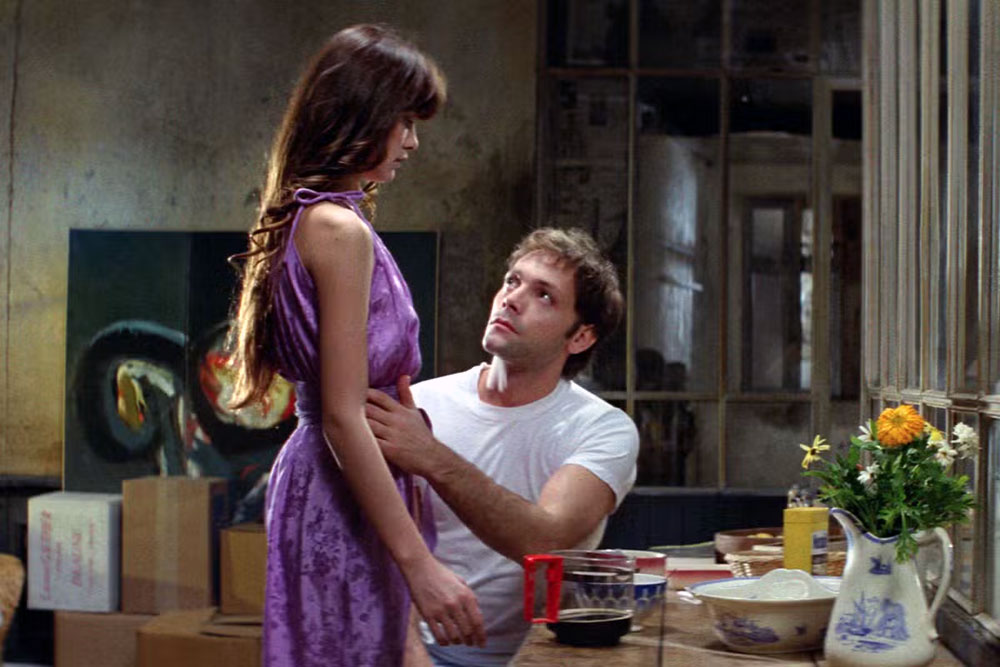In Beau-père, Rémi (Patrick Dewaere), a man in his thirties, is seduced by and begins a romantic affair with his 14-year-old stepdaughter, Marion (Ariel Besse), whose mother has just died in a car accident. Reading this plot—or if you’re familiar with Bertrand Blier’s controversial 1974 film Les Valseuses, featuring a vulgar Depardieu-Dewaere character duo—you may be surprised at how tactfully the film treats its delicate subject matter. Released in 1981, this was the third and final collaboration between Dewaere and Blier, following Les Valseuses and Préparez vos mouchoirs (1978), and the only one without Gérard Depardieu.
Beau-père opens with an upside-down reflection of a posh restaurant dining room viewed from a ceiling mirror. The camera slowly pans down until it rests on the main character, who’s playing the piano, his face inverted in the instrument’s reflection. Looking directly into the camera, Rémi sets the stage in song. While the film’s visual inversions may point to the perverse nature of its plot, the film’s recurring fourth wall breaks function as confessionals: screens or mirrors through which the characters relieve their guilt.
Distorted space and sound also work to place us intimately in the stepdaughter’s perspective. In one scene, the camera focuses on a jealous Marion as she listens through a wall to Rémi and a woman, Charlotte (Nathalie Baye), speaking in the next room. In a similar set-up later in the film, the camera shifts to Charlotte’s daughter as she stands in a bedroom doorway while the two adults presumably make love. This dissonance insinuates a possible origin of Marion’s infatuation: she may have overheard Rémi and her mother have sex, too.
Nevertheless, Blier’s films don’t aim to explain what they show. While innuendos are hinted at, the film doesn’t directly pass any moral judgment onto its story. Here, simply, as it were, a minor falls in love with her stepfather after her mother’s passing. It surpasses controversy primarily on account of its actors, who lend remarkable sensibilities to their performances. Blier had a gift for recognizing future great actors: he cast Depardieu in his first major role, a young Isabelle Huppert, Miou-Miou, Liliane Rovère, and, of course, Dewaere, but he also discovered Ariel Besse, who brilliantly portrays the stepdaughter here. Landing the role after Sophie Marceau turned it down, Besse regrettably stopped acting after just three films while Marceau went on to become a huge success.
The director passed away on January 20, just as I was discovering many of his films. Patrick Dewaere’s personal life vis-à-vis Beau-père evokes even more tragic coincidences. It feels as though he took his characters, set them aside, and then reincarnated them. He identified so deeply with his roles that his personal life became confused with his acting career. So often was he portraying troubled, depressed men that it, in turn, mirrored his own life. He was allegedly sexually abused as a child by his stepfather, whom he believed to be his biological father until the age of 17. His real birth father, who never legally recognized him, died at 35. In Préparez vos mouchoirs, his character laments Mozart’s fate, saying, “the poor guy is dead at 35 years old!” A few months after his last film, in which his character attempts suicide, Dewaere takes his own life at the age of 35.
Beau-père screens this evening, February 11, at L’Alliance New York as part of the series “The Ballad of Patrick Dewaere.”



